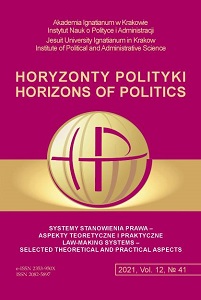Kompetencje społeczne a intencje przedsiębiorcze polskich studentów kierunków ekonomicznych w świetle teorii Golemana
Emotional Competence and Entrepreneurial Intentions of Polish Economics Students in the View of Goleman’s Theory
Author(s): Krystian Bigos, Adam MichalikSubject(s): Business Economy / Management, Higher Education , Organizational Psychology
Published by: Uniwersytet Ignatianum w Krakowie
Keywords: emotional competencies; entrepreneurial intentions; Goleman’s theory;
Summary/Abstract: RESEARCH OBJECTIVE: The article contributes to filling the research gap in the field of entrepreneurial psychology, broadly defined, and its aim is to empirically verify the influence of social competence on students’ entrepreneurial intentions. THE RESEARCH PROBLEM AND METHODS: The article presents the results of research conducted based on a questionnaire among Cracow University of Economics students concerning their self-assessment of social competencies and entrepreneurial intentions to verify the research hypothesis that there is a positive impact of the competencies mentioned on the existence of entrepreneurial intentions. THE PROCESS OF ARGUMENTATION: In the literature, researchers have relatively recently analyzed the impact of emotional competencies on entrepreneurial intentions. We decided to focus on one of the subgroups in this area: social competencies. Two subcategories can be distinguished: empathy and social skills, formulating research hypotheses about the positive influence of both these categories on the occurrence of entrepreneurial intentions. RESEARCH RESULTS: The research carried out confirmed the existence of a relationship between social competencies and entrepreneurial intentions. This relationship is more pronounced in the case of the social skills subcategory than empathy. However, we consider both of these groups to influence the formation of entrepreneurial intentions positively. CONCLUSIONS, INNOVATIONS, AND RECOMMENDATIONS: Entrepreneurial intentions should be stimulated in the education and development of young people also in the area of social competencies. In this case, it should be emphasized that the virtualization of the modern world and remote education processes promote isolation and individualization of attitudes at the expense of the development of the mentioned competencies, which was aggravated by the COVID-19 pandemic
Journal: Horyzonty Polityki
- Issue Year: 12/2021
- Issue No: 41
- Page Range: 107-122
- Page Count: 16
- Language: Polish

